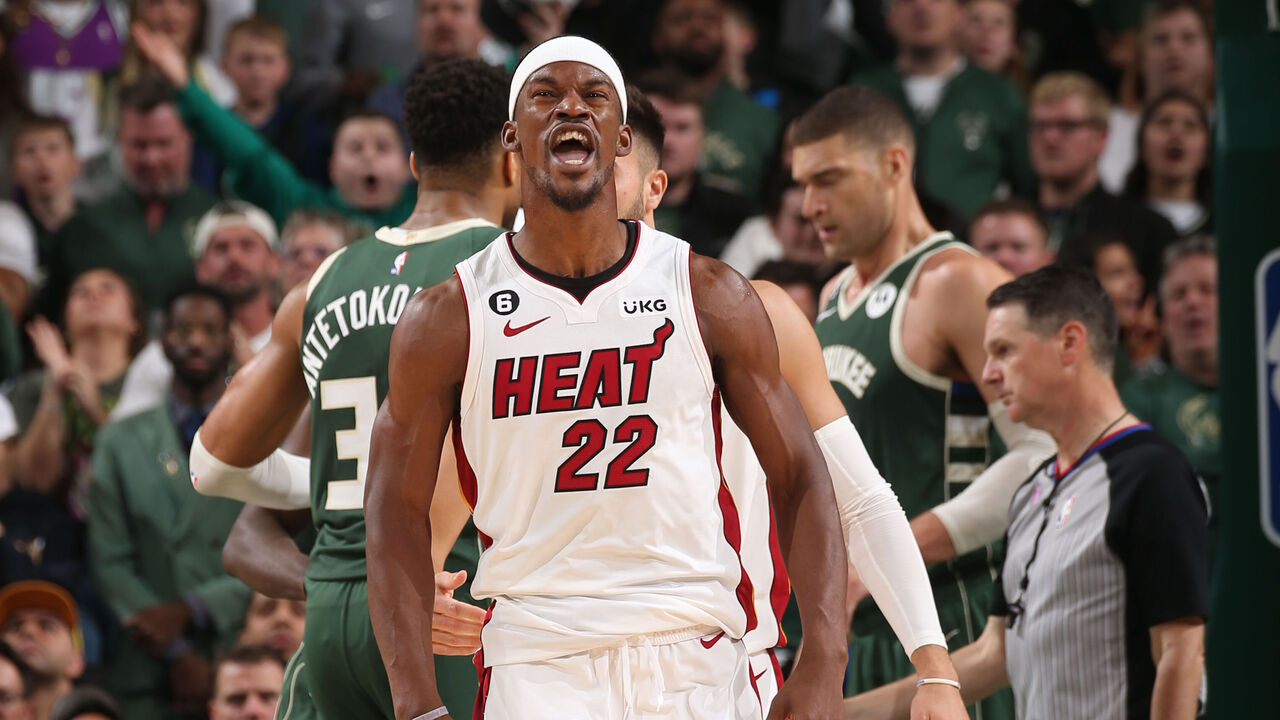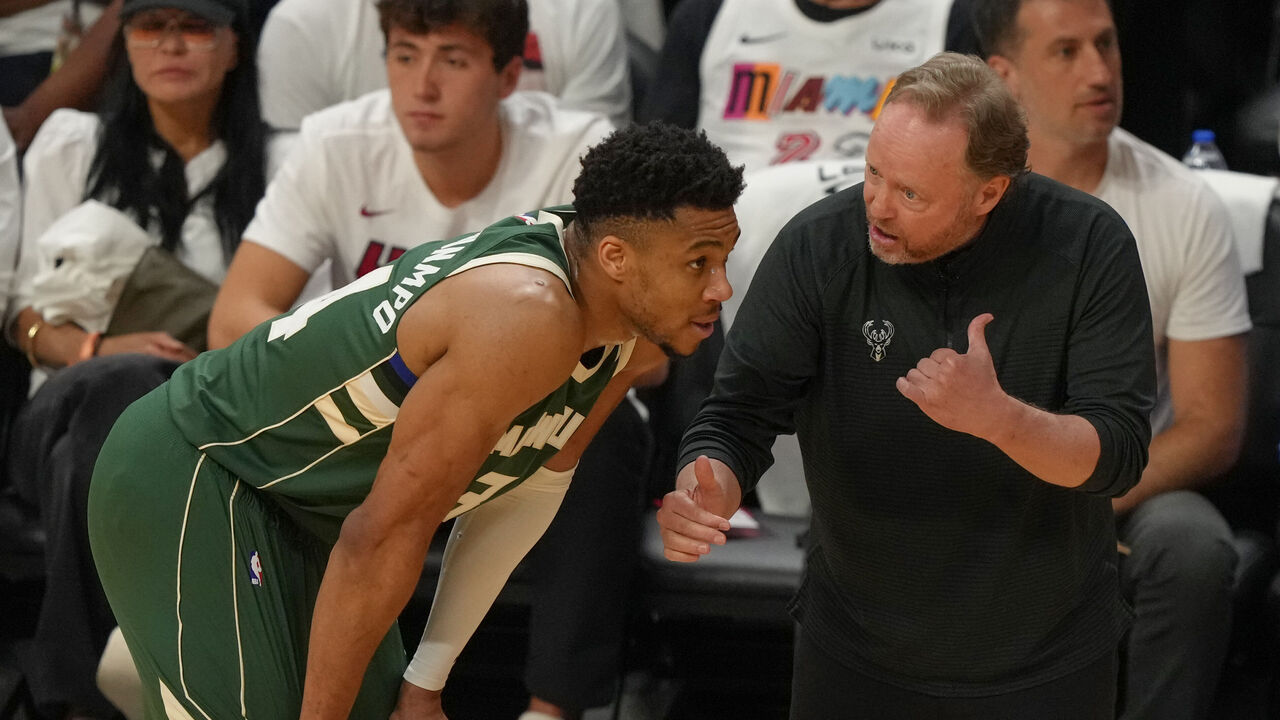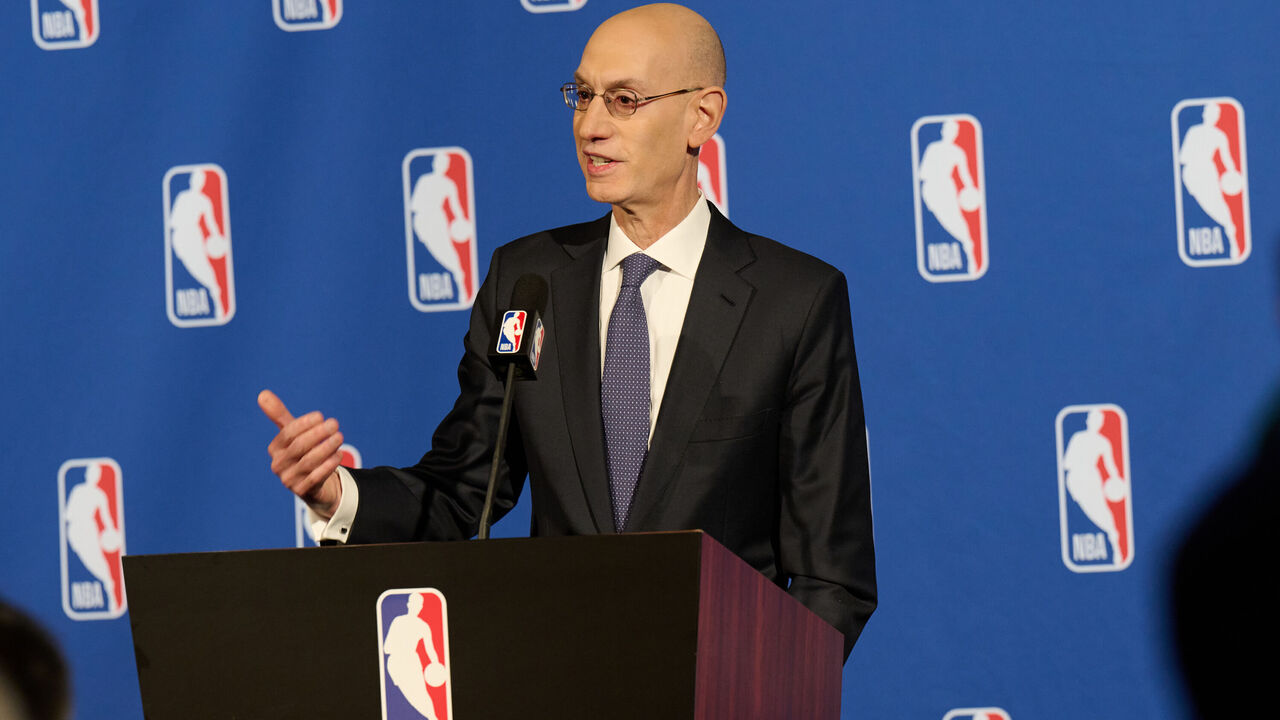Feel the Heat: 3 thoughts after Butler, Miami send top-seeded Bucks packing
For the second straight game, Jimmy Butler and the Miami Heat staged a furious fourth-quarter comeback to beat the top-seeded Bucks, this time driving the final nail in Milwaukee's coffin. The Heat became the sixth 8-seed to upset a 1-seed in the NBA playoffs, the fourth to do so in a best-of-seven series, and the third 8-seed to eliminate the NBA's top overall seed outright. Miami is also the first play-in team to win a playoff series, while Milwaukee became the first 1-seed to win only a single playoff game.
Here are three thoughts in the immediate aftermath of the stunning result.
Playoff Jimmy is a supernova

The word superstar doesn't do Butler justice right now.
Long ago, Draymond Green introduced the idea of 16-game players and 82-game players as a nod to the special breed of stars who excel during the postseason (and perhaps as a Draymond-esque jab at those who don't). Butler has proven time and again that he's the definition of a 16-game player. Other than perhaps prime LeBron James and a healthy version of Kawhi Leonard, this generation hasn't seen an All-Star caliber player who consistently finds another gear in the playoffs like Butler.
His tireless work to drag Miami to the 2020 Finals was the stuff of legend (and memes), and he was otherworldly again last year to bring the Heat within one shot of another Eastern Conference title, but he's somehow topping himself through one round of the 2023 playoffs.
In the five-game victory over the Bucks, Butler averaged 37.6 points, six rebounds, 4.8 assists, and 1.8 steals while shooting 64.1% inside the arc and 44.4% from deep. He also got to the free-throw line 9.6 times per game. Between his scoring and assists, Butler accounted for 41% of Miami's total offensive production in the series (254 of 620 points).
He somehow saved his best for last. The Heat's defense and the contributions of veterans like Kyle Lowry and Kevin Love helped put Miami over the top in Games 4 and 5, but Butler was the difference-maker, to say the least. Butler scored 98 points on 59% shooting in 87 minutes played between the final two games of the series, the last of which went to overtime after Butler spurred another unfathomable Heat comeback.
To close out Game 4, Butler singlehandedly outscored the Bucks 21-16 over the final 7:18, turning what was a 13-point fourth-quarter deficit into a Heat victory. To send Game 5 to overtime after Milwaukee had built a 16-point fourth-quarter lead, Butler singlehandedly outscored the Bucks 14-10 over the final 4:39 of regulation, capping the game-tying run with his most unfathomable bucket in the final second.
JIMMY BUTLER FORCES OT!!! HOW DOES HE DO IT!! 🤯
— theScore (@theScore) April 27, 2023
(🎥: @NBAonTNT)pic.twitter.com/8B67335qcu
As if all of these outrageous feats weren't impressive enough already, consider that it was the league's fourth-ranked defense that Butler spent the last week eviscerating, and it was primarily all-world defender Jrue Holiday that he punished more than any other Buck.
Another trip to the Finals - or dare I say a title run - might seem unlikely, but with Butler on your side this time of year, nothing is ever out of reach.
An embarrassing showing from Milwaukee

Losing two of the first three games was excusable, as Giannis Antetokounmpo played just one of the series' first six halves, and Miami rode what appeared to be unsustainable shooting luck to a Game 1 road victory. But then Giannis came back in Game 4, and after cruising for most of three quarters, the Bucks still melted down, only to do it again at home with their backs against the wall in Game 5.
There's plenty of blame to go around. Antetokounmpo went 10-of-23 from the free-throw line on Wednesday, with the Greek Freak so rattled by the thought of going to the line that he nearly turned the ball over late in regulation playing hot potato while the Heat tried to foul. His scary Game 1 fall left him with an ailing lower back upon his late-series return, but the Bucks still needed more from the two-time MVP.
Milwaukee's offense, which was mediocre all year, looked woefully inept when it mattered most, as Antetokounmpo, Holiday, and even Khris Middleton struggled to create clean looks. The Bucks, who ranked 15th in overall offensive efficiency and 12th in half-court efficiency during the regular season, made just three field goals in the fourth quarter of Game 5 while committing five turnovers.
In a grotesquely fitting end, time ran out on Milwaukee's season while Grayson Allen, of all people, was still Euro-stepping to the basket. Before the ball ever found poor Allen, the possession saw Butler stonewall a Giannis-led fast break (that ended with Antetokounmpo falling) and Middleton unable to get a shot off against the defensive pressure of Caleb Martin and Max Strus.
Meanwhile, head coach Mike Budenholzer appeared overwhelmed by the moment. The Bucks failed to use their final timeout of regulation after Butler tied the game, which would've given them at least a chance at a game-winner after advancing the ball. Bud also took Defensive Player of the Year runner-up Brook Lopez off the court before Butler's game-tying basket, perhaps as an overreaction to Erik Spoelstra pulling Heat center Bam Adebayo. The decision left the Bucks without their best rim-protector while trying to defend an after-timeout play up two points with two seconds left.
Budenholzer then left two timeouts in his pocket in overtime, even as the final possession of Milwaukee's season spun out of control. Bud and his staff also seemed unwilling or unable to concoct more creative defensive schemes to slow Butler, often leaving Holiday to guard Jimmy Buckets on an island despite the fact Butler was tormenting the All-Defensive caliber guard.
Jimmy Butler's isolations produced 1.34 points-per, including assists, against the Bucks. According to the tracking data, which admittedly isn't perfect and uses pretty strict definitions, he never saw a double team.
— Couper Moorhead (@CoupNBA) April 27, 2023
It was all reminiscent of the postseason demons Budenholzer, Antetokounmpo, and the Bucks had to overcome before breaking through to win the 2021 championship, with Butler and the 2020 Heat similarly embarrassing them. The Bucks, who blew a 2-0 lead in the 2019 East finals as the No. 1 overall seed and lost to Boston in a hard-fought, seven-game second-round series as defending champs last year, should be thankful every day that Kevin Durant's toenail was on the line in 2021. This core's postseason resume is otherwise underwhelming, their disposition downright embarrassing.
With Lopez headed for unrestricted free agency this summer and only a $40.4-million player option left on Middleton's contract, this may have been Milwaukee's last run with its championship core. If so, what a sad way to bow out.
The case for re-seeding

A topsy-turvy 2023 postseason has reinforced the need for the NBA to re-seed teams after the first round. The fixed-bracket format allows for clearer scouting, planning, and travel logistics for teams (plus easier office pools for fans), but the results of this year's conference quarterfinals should at least lead to a discussion in the league's top offices about re-seeding.
Assuming the Celtics take care of the Hawks at some point over the next two games, the East's second round will see second-seeded Boston clash with third-seeded Philadelphia while fifth-seeded New York takes on eighth-seeded Miami. In addition to this format being a disservice to the highest seed still standing, a fixed bracket also punishes the next-best team. The 54-win 76ers will likely start the conference semifinals on the road in Boston, while the 47-win Knicks will have home-court advantage in the same round.
Out west, we could see a similar story play out. If the Warriors and Lakers finish off the Kings and Grizzlies, respectively, the conference's sixth and seventh seeds would play each other for a berth in the West final, while top-seeded Denver's reward for earning the conference's best record is a date with fourth-seeded Phoenix. Meanwhile, the sixth-seeded Warriors would have home-court advantage in the same round that the fourth-seeded Suns tip off in Denver's thin air.
You could argue such upsets happen so infrequently that it isn't worth the outrage, but what's the point of earning regular-season accolades if the rewards don't carry over from the first round to the second? In the league's continued quest to add meaning to regular-season contests - even for surefire playoff teams - this one seems like a no-brainer.
Not to mention, with a more balanced league in the midst of perhaps the greatest era of parity since the late-'70s, this season's opening round may soon become the norm rather than a random blip on the radar to be ignored in such discussions.
Joseph Casciaro is theScore's senior content producer.
HEADLINES
- IIHF president on Olympic arena delays: 'We're going to have a tournament'
- Redick: LeBron exhibiting 'a different kind of greatness' this year
- Jets' Fleury alert, moving extremities after leaving ice on stretcher
- Flyers' Zegras: Feels 'f---ing amazing' to score twice, beat Ducks
- Wembanyama returns with 30 but Spurs fall to Grizzlies